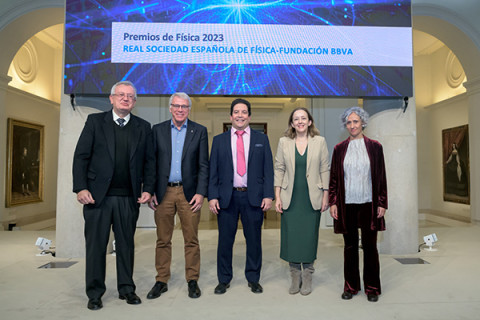'40 Years Watching Atoms', award of the Spanish Royal Society of Physics - Fundación BBVA

The article '40 Years Watching Atoms,' written by researchers from the Materials Science Institute of Madrid (ICMM-CSIC) and the Institute of Micro and Nanotechnology (IMN-CSIC), has been awarded the Best Outreach Contribution prize in the publications of the Royal Spanish Society of Physics (RSEF). The award was granted by the Royal Spanish Society of Physics (RSEF) – BBVA Foundation, and the jury highlights its "clear exposition of the fundamentals and development of scanning probe microscopy."
The work was carried out to delve into the subject matter covered in the documentary of the same name, which was created to commemorate the 40th anniversary of the discovery of the scanning tunneling microscope (STM) and also served as a tribute to two researchers from the Autonomous University of Madrid (UAM), pioneers in this technique: Jose María Gómez Rodríguez and Juan José Sáenz Gutiérrez, who passed away in 2020, "and were an important part of the Spanish school working on so-called proximity microscopies (SPM)," highlighted the authors.
The jury emphasizes that the topic of the article published in the Spanish Journal of Physics, scanning probe microscopy, is "a subject of extensive interest and one that paved the way for nanotechnology." Furthermore, the article recognizes and disseminates the significant role that the scientific community has played during the revolution in surface exploration over the last four decades.
"The narrative, as engaging as it is rigorous, celebrates the contributions of prominent national researchers and uncovers little-known episodes in the history of physics in Spain," states the jury's decision, which was announced on Monday, September 25, 2023.
In addition to bringing this microscopy technique and its contributions to nanotechnology closer to the general public, the authors aimed to pay tribute to the Spanish scientific community, which played a significant role in this milestone. "Taking into account history allows us to appreciate what we are developing in this country," explains Agustina Asenjo Barahona in the accompanying interview.
"And there was a moment when a group of Spanish scientists, led by Nicolás García and Arturo Baró, both physics professors at the Autonomous University of Madrid, managed to develop a tunneling microscopy laboratory," adds the researcher, who continues, "This was during a very challenging time for science in Spain, in the mid-1980s. Therefore, we must value the efforts of those individuals who managed to build a community from scratch that continues to work in this microscopy and is recognized internationally."
Asenjo Barahona believes that the dissemination of scientific milestones, such as the invention of the tunneling microscope, is crucial for the general public to understand the importance of physics: "It is very important to know the state of materials science because these are the materials we have around us—our phones, our cameras, our cars, our buildings. There is a whole development in physics and materials science behind them, and it is important to convey this to society."
The documentary of the same name, directed by the authors of the article and edited by Carlos Arroyo (ICMM-CSIC), can be watched online on the CSIC Divulga YouTube channel, and since November 2021, it has accumulated over 23,000 views.
The script was authored by Agustina Asenjo (ICMM-CSIC), Pedro Serena (ICMM-CSIC), and José Miguel García-Martín (IMN-CSIC), while the editing was done by Carlos Arroyo/Morgan, also from ICMM-CSIC. All the work was carried out as part of the activities of the Festival of Nanoscience and Nanotechnology (10alamenos9) with the support of the CSIC Delegation in Madrid.
Instituto de Ciencia de Materiales de Madrid (ICMM)
Sor Juana Ines de la Cruz, 3
Cantoblanco, 28049
Madrid, España
Telephone: (+34) 91 334 90 00
Email: @email
Communication Office: @email

Acknowledge the Severo Ochoa Centres of Excellence program through Grant CEX2024-001445-S/ financiado por MICIU/AEI / 10.13039/501100011033

Contacto | Accesibilidad | Aviso legal | Política de Cookies | Protección de datos
